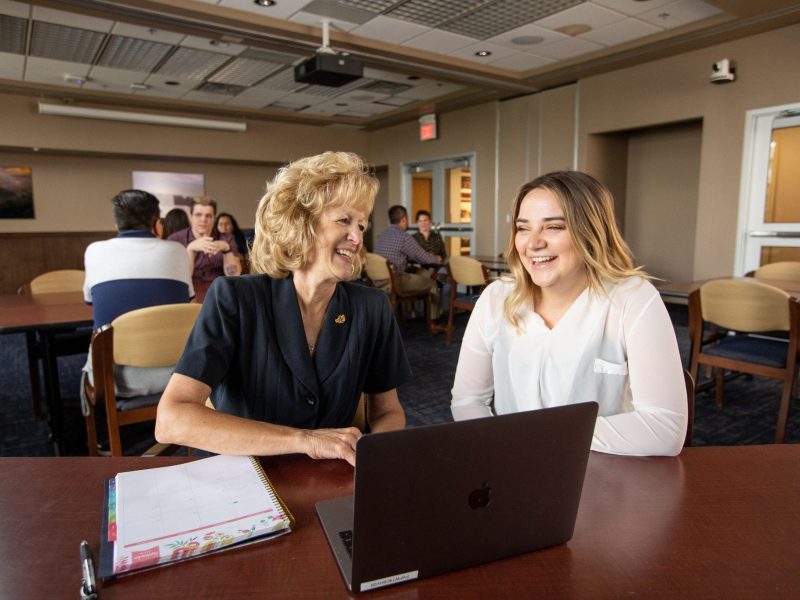Featured SBS alumni
Alumni Spotlight
Marcos Trujillo
Marcos Guerrero Trujillo, MA
(Pronouns: They/Them/Theirs)
Instructional Faculty, Ethnic, Gender and Transborder Studies, and Sociology Discipline Coordinator
Pima Community College, Tucson, Arizona
Where has life taken you since leaving NAU?
Since leaving NAU, I have moved to Tucson, Arizona. After graduating, I was looking for a job where I could apply my newly attained skills and perspective without having to move out of Arizona. Through some friends, I learned about the Southern Arizona AIDS Foundation, where I worked for four years as a health education specialist who provided education to middle school, high school, and college students about comprehensive sex education, STI prevention, and substance abuse prevention. While doing outreach for that job, I met faculty from Pima Community College (PCC) in the ethnic gender and transborder studies department, who encouraged me to apply to teach with them.
What are you doing now for work and passion? How is your Women’s and Gender Studies scholarship helped you to get where you are now?
I currently teach as full-time faculty at PCC in the Ethnic Gender and Transborder Studies Department. Within the department, I teach sociology and gender and women’s studies. Our department is interdisciplinary, so it is actually my WGS scholarship that made me the ideal candidate for this position. Being able to connect sociology to the fields of ethnic and gender studies gives me the ability to teach, engage students from different experiences and backgrounds, and connect their experiences to what we are learning about.
Do you feel your work is valued?
Yes and no. I value this work so much, and the people in my department value it, but critical fields like ethnic and gender studies pose a threat to systems of power and privilege that can make people uncomfortable or actively resistant to the work that we do in our fields. So, I absolutely know that works are valuable, but society at large does not always appreciate it as such.
What is the most surprising thing about transitioning out of the university?
How little we are prepared for working life as a professional. Most programs do not require internships or any sort of direct experience that helps you develop the skills you need to apply what you have learned in classes to the work you do. I encourage people to think about different ways they gain access to the “realities” of the work they are interested in to help them understand what they know and what they might want to develop as they apply for jobs or consider further education and graduate work.
What reflections do you have on the Women’s and Gender Studies (WGS) program after leaving? What is the most important thing you learned in your time at NAU (whether it be inside or outside of the classroom)?
I really appreciated the variety of classes that people can take that count towards the graduate certificate in WGS. I was very fortunate to study with students and professors whose identities and experiences were from a diverse collection of nationalities/ethnicities, academic backgrounds, gender identities, and sexualities. I appreciate that our classes provided a critical place for us to learn, but also to learn from one another and understand our experiences in the context of difference.
What was the most important aspect of your scholarship in WGS?
Being exposed to and learning about gender and sexuality and the politics of the body from non-Western perspectives is something I deeply appreciate. I am grateful for the opportunity to develop the skill of decentering our cultural assumptions about gender and sexuality, and this is something that I will need to work on and continue to develop over the course of my career and life.
What work (community or self) do you see as most critical at this moment?
Learning about disability and the ways we are socialized and encouraged to be part of and perpetuate an ableist ideology. It requires a lot of intention, work, and accountability to begin to understand the variety of experiences and identities people with disabilities embody, and how academics, activist spaces, art spaces, and community spaces have so much room for improvement.
Who inspires, enlightens, and pushes you to keep going?
People may have seen this or a similar image online or on social media, but there was a picture I saw a couple of years ago that said something like, “Be the person you needed when you were younger.” Trans and gender non-conforming kids are so important, beautiful, and lovely that I often think about what my life would be like if I had trans elders or adults in my life that I could have looked to, or looked up to as a kid. Seeing the bravery and self-love that some youth are able to express is an amazing reminder and inspiration to be who I am and not apologize for it.
Do you have any advice for current WGS students?
I had this amazing advice given to me as a student at NAU by Dr. Burford (I’m not sure if someone told them the same thing as a student). I have never forgotten it and tell it to my students often, which is, “Claim your education.” In order to get the best of the resources that are available to you as a student, you need to actively claim them, utilize them, and set expectations for yourself of what you want to gain from a class, program, or degree. There are people who will support and encourage you, but your investment and active participation in your education are fundamental to receiving the best that people and programs have to offer. So value yourself, your perspective, your creativity, and claim your education!
